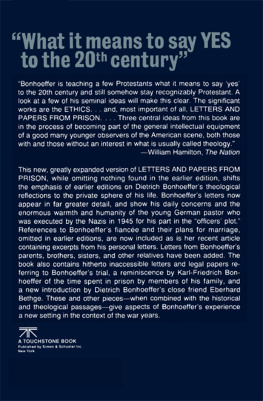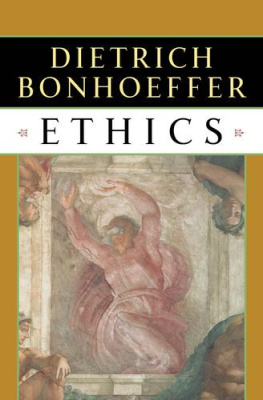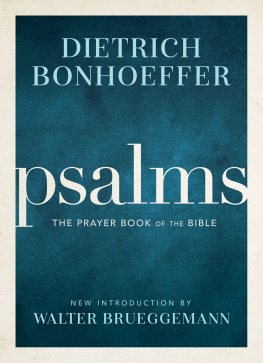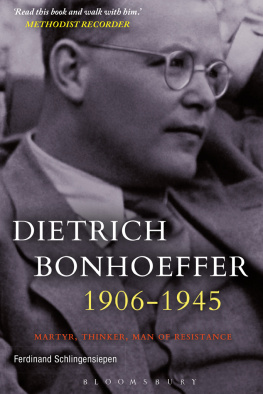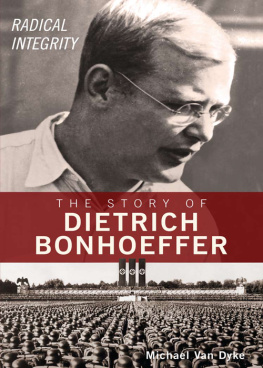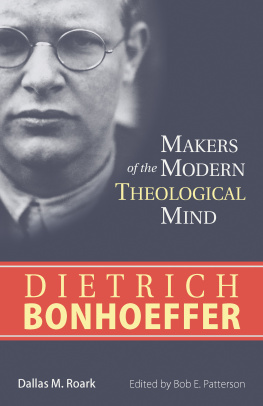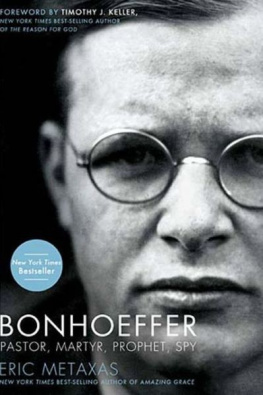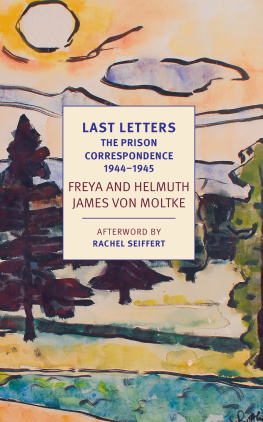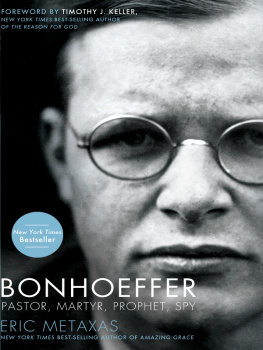


TOUCHSTONE
Rockefeller Center
1230 Avenue of the Americas
New York, NY 10020
www.SimonandSchuster.com
Copyright 1953, 1967, 1971 by SCM Press, Ltd.
Translated from the German Widerstand und Ergebung:
Briefe und Aufzeichnungen aus der Haft (Munich: Christian
Kaiser Verlag, 1970). The translation incorporates the text
of the third English edition produced by Reginald Fuller,
Frank Clark and others; additional material by John Bowden.
All rights reserved, including the right of reproduction
in whole or in part in any form.
First Touchstone Edition 1997
TOUCHSTONE And Colophon Are Registered
Trademarks of Simon & Schuster Inc.
Manufactured in the United States of America
13 15 17 19 20 18 16 14 12
Library of Congress Cataloging in Publication data is available
ISBN-13: 978-0-684-83827-4
eISBN-13: 978-1-451-65053-2
ISBN-10: 0-684-83827-3
Contents
Prologue
After Ten Years. A Reckoning made at New Year 1943
Epilogue
Memories of a Survivor. Karl-Friedrich Bonhoeffer to his children, June 1945
Preface to New Edition
I have delayed a long time before interfering with the make-up of Letters and Papers from Prison as it was planned and brought into being in 1950-1. At that time, my primary intention was to make available to a group of people who were interested in Bonhoeffer some short, specifically theological, meditations from Tegel. Extracts had been transcribed for a few friends even before the end of the war, and there were a couple of copies in my desk. But what were the theological considerations without their setting in the circumstances of the time? I had to guard against the misunderstanding that this was a tractate or monograph by Bonhoeffer on a chosen theme and not authentic correspondence. So other parts of Bonhoeffers letters to his parents and to me were added - and the whole became a book.
Nevertheless, I was extremely cautious about including passages about personal relationships or relationships within the family and about deciphering any such references. Thus, for example, to begin with hardly a single reference to Bonhoeffers fiance appeared. The decision whether or not to publish accounts of this aspect of the period in Tegel had to be left to her. Of course, even then the fate of the author of the correspondence from Tegel and his attitude towards it played a decisive part in the selection of passages from the letters which did not have an immediate bearing on theology.
Whatever I expected to happen as a result of the publication of the letters has meanwhile been completely put in the shade by the reception that has actually been given to them throughout the world. The situation to which the book is addressed has now undergone a fundamental change. When a short while ago the English publishers of Letters and Papers from Prison undertook a complete revision of the translation, the reason they gave for this expensive course of action was that the book was now included among the religious classics.
In the two decades since the book was planned, there have been increasingly urgent inquiries as to whether it would not also be possible to make available any objections, counter-questions or suggestions that Bonhoeffer may have received by letter while he was in Tegel. Such requests have so far remained unfulfilled, because I have felt that the replies to Bonhoeffers correspondence which have been preserved are seldom on anything like the same level as Bonhoeffers own theological reflections. There is good reason for this point of view even today. Nevertheless, those who seek a more complete picture are probably right, particularly now that there is an increasingly clear recognition that Bonhoeffers theology is interwoven with the course of his life and that the forces which gave rise to it are being studied much more deeply.
The new edition called for on the occasion of the twenty-fifth anniversary of Bonhoeffers death, on 9 April 1970, finally led me to propose a considerable expansion. After a quarter of a century, personal and family considerations have retreated into the background. The significance of the action and thought of this man has long since left the private sphere.
Bonhoeffers own letters to his family and his friend now appear in much greater detail than hitherto, and for the first time extracts have been printed from letters written to him by his family and his friend. Finally, the volume puts in context notes on the interrogations, hitherto inaccessible, on which a first commentary has been made in my biography. The sketch of the last days of Bonhoeffers life, a preliminary study for the biography, which appeared at the end of earlier editions, is now to be found in the biography itself; in this new edition it has been replaced by Karl-Friedrich Bonhoeffers reminiscence of the time spent in prison by members of his family. This and some other pieces give aspects of Bonhoeffers experience, as well as the historical and theological passages, a new setting in the context of the war years.
These more comprehensive selections have been put as far as possible in strict chronological order. It seemed most natural to divide the imprisonment into periods, following the decisive points of the legal investigations. It was these that determined Bonhoeffers existence in prison. Thus we have:
I The phase of the preliminary investigations;
II The continually vain waiting for a date for the trial;
III The period of hope for the overthrow of Hitler and the ditching of the charge;
IV The time after the catastrophe.
These developments are seldom alluded to directly in the material, but they form a continual background to the communications. Inside, in his cell in Tegel, Bonhoeffer was able to do nothing; but outside, the family was able to exert its influence by constantly interfering secretly with the course of the investigation or trying to have it dropped. None of this, of course, was put on paper. The new basis for division is not a theological one. In this book, such a division cannot either be extracted or established.
The reader should note how strongly the censorship of those letters which were not smuggled out has affected both the way in which they are written and what they say; this is true above all of the first months at Tegel. Thus, for example, in letters from Bonhoeffers mother there are sentences which she would never have written in normal circumstances, such as references to the age of Bonhoeffers parents, assertions of innocence, questions about imaginary attacks of asthma and other comments about aspects of illness.
Although the picture of the period of Bonhoeffers engagement is now much more vivid than it was before, his correspondence with his fiance will still be missed. However, she herself has kept control over the disposal of the letters. In this respect, therefore, we are restricted to an attractive article, written in English, by Maria von Wedemeyer, which contains some quotations from letters written to her.
Substantially extended notes have been provided for the new edition. They give information about family relationships, biographical details and the history of the time. They also decipher codes in the correspondence and add the words of biblical passages and hymns that are mentioned.
There can be no doubt that the expansion has noticeably shifted accents in comparison with the earlier edition. The private element has been heightened. This may even give rise to the impression that the period of the letters and some of the things that have been said in the meantime have been moved even further into the past. Nevertheless, the reader will also find that he can encounter at greater depth an authentically attested piece of the history of our time, which is also part of the history of Christian devotion and theology. Here is an account of the life lived by some conscientious Christians and others at a greater remove from belief, when the dilemma of both an external and an internal destruction came upon them. It was at precisely that point that Bonhoeffers visions of a future Christianity took shape.
Next page
